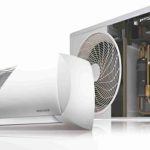With the onset of summer, do you dream of living in a refrigerator? Fans and drafts don't help? It's time to buy an air conditioner. How to choose air conditioners for an apartment in 2017? Let's talk about this.
Air conditioner in theory
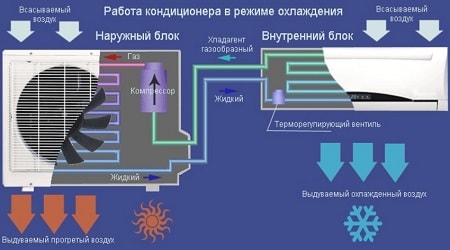
Before figuring out how to choose the right air conditioner, you need to understand what kind of device it is. But there is no magic here. Physics only. Elementary.
Air conditioning systems are closed-loop systems in which the aggregate state of the refrigerant changes. This happens due to changes in temperature and internal pressure. The liquid evaporates, turns into gas and absorbs thermal energy. And with the reverse transformation (from gas to liquid), it gives it away.
Simply put, the air-conditioned design does not generate cold. It takes heat from your apartment and transfers it to a condenser located outside. All refrigerant work is supervised by the compressor.
Modern refrigeration structures are capable of not only “abducting”, but also “bringing” heat into the house. Without going into the technical details of the process, we can say that the condenser and the evaporator are reversed.
By the way, the first air conditioner was developed far from “heavenly conditions” in the room. His job was to save an American print shop from high humidity that was damaging print quality. This means that all "cold producers" without exception absorb moisture together with heat.
Poorly humidified air is the main cause of many respiratory diseases. Of course, choosing an air conditioner is an important step, but you shouldn't forget about your health either. Therefore, before purchasing a device, do not be too lazy to install additional sources of air humidification.
See also:
- 5 best Toshiba air conditioners of 2019
- The 5 best Panasonic air conditioners of 2019
- 5 best LG air conditioners of 2019
- The 5 best Daikin air conditioners of 2019
- 6 best Mitsubishi Electric air conditioners of 2019
From theory to practice, or what air conditioners are
How to choose an air conditioner for your home? Let's start with what types of air conditioners for your apartment can be found on the modern home appliance market. Do you think there are many of them? It seemed to you. In fact, there are only two types of household cooling systems:
- split systems;
- monoblock devices.
![]() See also - Which air conditioner manufacturer is the best in terms of price and quality?
See also - Which air conditioner manufacturer is the best in terms of price and quality?
What are split systems
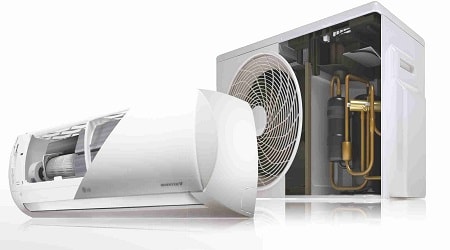
Split systems are the lion's share of the market in the air conditioning segment. They consist of a pair of blocks. One is placed in the dwelling, the second is brought out. They are connected to each other by copper pipes (refrigerant circulates through them) and an electrical wire.
Split systems are: wall-mounted, duct, inverter, column, cassette, floor-ceiling, multi-split systems. Let us examine in more detail the advantages and disadvantages of each of the designs.
- Wall split system. Cheap and powerful enough (2-10 kW).Its indoor unit is installed above the window in the room, and the outdoor unit underneath it on the outside of the building. This unit is an excellent solution for cooling small rooms (10-100 m²).
- Channel split system. Hidden behind a false ceiling. Works on the principle of heat-insulated air ducts. Creates a favorable microclimate in several rooms at the same time. The advantage of a duct air conditioner is that it supplies air in the volumes required for comprehensive ventilation of the conditioned areas.
- Cassette split system. It is mounted in the same way as a channel split system. But the air "cassette" is dispersed through the lower block, the size of which is 60x60 cm (like a standard ceiling plate). But power dictates size. The more powerful the unit, the larger it is. The main advantage is inconspicuousness. The unit is hidden from view and covered with a grill. Designed for cooling large areas.
- Column split system. It is ideal for large rooms that require powerful cooling. The system is installed on the floor, away from people.
- Floor-ceiling split system. An excellent alternative to the "cassette" in the absence of a false ceiling. Such air conditioners can be installed both at the bottom and at the top of the wall. Their placement dictates the trajectory of the air flow. The advantage of this split system is that the coolness is distributed evenly throughout the room, without harming those present in it.
- Multi split system. A unique modification of split systems that allows you to connect up to five indoor units of various designs and performance. Units of this type are installed where there is no possibility of outputting external units to the outer wall of the building. They have a significant drawback - turning off the external unit leads to the shutdown of all internal ones.
- Inverter split system. It is a separate type of air conditioner with a variable frequency compressor motor. The inverter converts AC to DC and vice versa. The second conversion changes the motor speed. This allows you to adjust the cooling capacity and heat supply. Unlike all other types of air conditioners, the inverter works constantly. First at full power to reach the set temperature, and then at low power to maintain it. At the same time, power consumption is 20-50% lower than in simple cooling systems. Plus, compressor wear is reduced and noise levels are reduced.
![]() See also - What is the best floor air conditioner for home
See also - What is the best floor air conditioner for home
What are monoblock air conditioners
Monoblock refrigeration units are also divided into two groups:
- Window. They are mounted in windows or a thin wall in such a way that the "back" is outside the building, that is, on the street. The advantages are low price and ease of installation. The disadvantages of such an air conditioner for an apartment include a high noise level and a violation of the thermal insulation of the room.
- Mobile. Stand out from others for their portability. They are easy to install and move freely inside the building. The system is easy to operate, but not effective. Cons: noise, cost, low level of maintaining a comfortable indoor climate.
![]() See also - How to repair an air conditioner yourself
See also - How to repair an air conditioner yourself
Power is everything
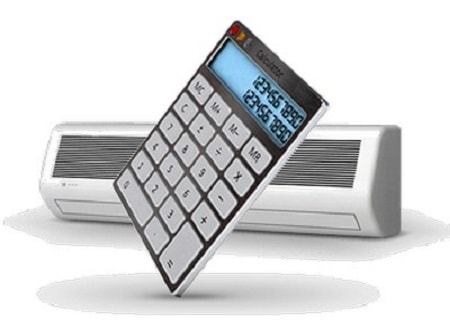
Oh, how many things! Don't panic. Let's figure out how to choose the most suitable air conditioners for an apartment, so that it is of high quality, inexpensive, and pretty. Go!
- Decide what you are buying the unit for.
- Take measurements. Write down the parameters and type of room to be cooled.
- Decide how much money you want (can) spend on buying an air conditioner.
Is it done? Now let's talk about the performance of the units. That is, how much coolness or heat this or that air conditioner can “nudge” from the space. If you calculate the power incorrectly and buy the wrong one, you:
- waste your money on a "weak" device that is unable to meet your requirements;
- you will acquire a powerful unit, the potential of which is much higher than what is needed for the room where it is installed.
How to avoid this? When choosing a cooling system, consider the following parameters:
- Calculate the approximate consumption of "chill" according to the formula: 1000 W for 8 m².
- If direct sunlight penetrates into the building for at least half of the day, add another 20-30% to the resulting figure.
- Now add to this the amount of excess heat from the electrical appliances in the room. On average, this is 30% of the power consumed by a particular device.
- To the result obtained we add the excess heat of all people who are in this room (100 W / person - home / office, 150-300 W / person - catering and gym, respectively).
If you count laziness, rely on the approximate data of the plate:

Air conditioner and its functions
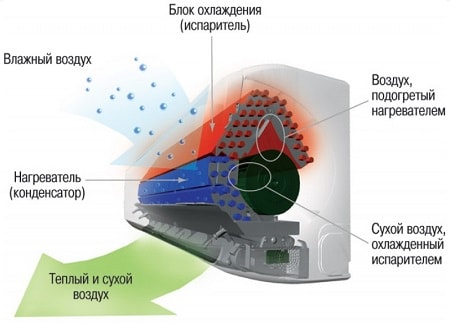
How to choose an air conditioner according to parameters? What to look for? What feature is worth paying for? What else can surprise the cooling system? If these questions keep popping up in your head, let's look for answers together. Let's start with the main one.
- Cold and warm. This, in fact, is what the device is purchased for. If everything is clear with cooling, then it would not hurt to understand with heating. There are some nuances here.
Any air conditioner you choose will not save you from frost. And all because the lower limit of the temperature regime of the device is no more than 5 degrees in both directions. Using an air conditioner in winter quickly wears out the compressor or leads to its breakdown.
To avoid this, the manufacturer equips the air conditioner with additional "winter kits", which significantly increase the cost of the unit. At the same time, the efficiency of the device at subzero temperatures decreases by more than 30%. In general, you will not be able to enjoy the desired warmth from the air conditioner, and there can be no question of heating the entire room. It is more expedient to use cheaper and more efficient "old" methods of heating residential (and not only) premises.
- Ventilation. Required base function. In this mode, the motor "sleeps", and only the indoor unit fan works, which helps to evenly distribute the air around the entire perimeter of the room.
- Auto mode. The air conditioner decides for itself which function to activate. Of course, depending on external circumstances (temperature, humidity, pressure). You don't have to pick anything up. The unit will do everything for you.
- Drying. In this mode, the air conditioner reduces the humidity in the air.
- Airflow direction adjustment. A useful feature that will save you and those around you from direct contact with cold air flow. Rest assured, now nothing will "blow" you out of your usual rut.
- Timer. A useful thing for the "forgetful". Just set the time for turning on and off the unit and do not worry about anything.
- Night mode. Creates the most "comfortable" cool conditions for sleeping. The engine speed decreases, the noise decreases. After seven hours, the device automatically turns off.
- Installation. You should not save here. Correct installation of the air conditioner is the key to its long-term operation. Please note that this service is not cheap. Installation of the unit will cost you at least 30% of its cost. But this is much cheaper than subsequent (possibly repeated) repairs.
![]() See also - 10 best bathroom fans
See also - 10 best bathroom fans
The price of the issue of coolness at home
How to choose the right air conditioners for an apartment? If you are looking to buy a technical piece of art, then you should pay attention to the top class units. They are produced exclusively by Japanese corporations, and include the most "delicious" technical developments of our time.
Mid-range air conditioners are produced by both Japanese and European manufacturers.These units are of high quality, but have a shorter service life than their expensive counterparts.
The budget market belongs to Korea and China. In this segment, there are no clear rules of the game for either quality or price. Such air conditioners are assembled from cheaper materials, have modest functionality and short service life. In some cases (a sharp change in pressure, temperature, humidity), a cheap unit can turn into a threat to your life.
Before making a choice, weigh the pros and cons. Compare the technical characteristics of the models you like. Don't chase cheapness. A quality product + professional installation is a guarantee of your safety for many years to come.
Did this article answer the question of how to choose air conditioners for an apartment in 2017? Leave your comments. It is important for us to know your opinion in order to get better. Until next time!
See also:
- 7 best Hisense air conditioners according to customer reviews
- 9 best Electrolux air conditioners of 2019
- The 10 best Ballu air conditioners of 2019
- Top 10 General Climate air conditioners according to customer reviews
- 20 best air conditioners for home


